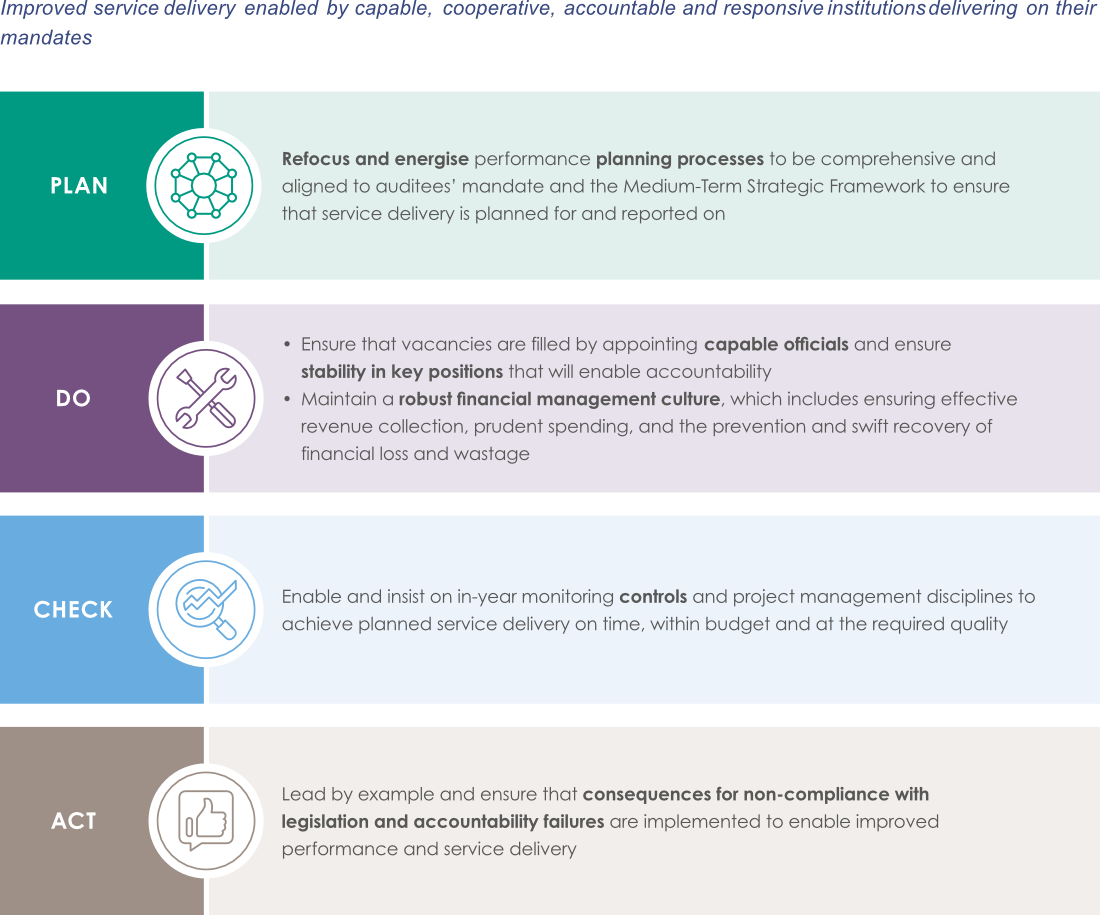CALL TO ACTION
Activating the accountability ecosystem
While we are encouraged by the upward trend in audit outcomes, focused attention needs to be directed urgently towards the key service delivery portfolios and state-owned enterprises to relieve pressure on the fiscus and to improve the lived experience of the people of South Africa.
As stated in the Reconstruction and Development Programme and reiterated in the National Development Plan, attacking poverty and deprivation must be the first priority of a democratic government. We call on all our stakeholders that play a pivotal role in the accountability ecosystem to stimulate and promote a culture of accountability that will improve service delivery and create tangible prospects for a better life for our people.
Where audit outcomes remain poor and service delivery failures persist, we assessed the key reasons underpinning this state, and found the following:
- Poor planning and budgeting, as well as a lack of setting quality indicators and targets that are measurable and aligned to auditees’ mandates, hampers sustainable improvements in performance management and service delivery.
- Compromised control environments and a failure to embed preventative controls and implement basic financial management disciplines hinder auditees’ ability to properly manage their finances and performance, leading to poor service delivery.
- Pre-existing system and process deficiencies, including poor project management and capacity constraints, weaken service delivery even with the best action plans.
- Intergovernmental fragmentation and lack of coordination further hamper service delivery.
- Limited commitment from assurance providers, including management and leadership, to fulfil their monitoring, governance and oversight roles creates a culture of no accountability and consequence management leading to poor performance.
While a clean audit is not always an indicator of good service delivery, a well-functioning control environment and good systems form a solid foundation that will enable auditees to move one step closer to improving performance and service delivery. Some auditees are making a concerted effort to improve their audit outcomes, but the pace at which deficiencies in financial and performance management and compliance with legislation are addressed needs to be accelerated.
Accounting officers and authorities know what must be done – they have received our messages and recommendations for many years. We gave them reports, notified them of material irregularities and regularly engaged with them to share risks that need to be addressed and good controls that need to be implemented. Yet, a slow – or even no – response by accounting officers and authorities and senior management to our recommendations on improving controls and addressing risk areas was the most common root cause for poor audit outcomes during the term of the administration.
If the root causes of deficiencies identified remain unaddressed, it could mean that those responsible for addressing them do not understand these root causes well enough to correct them; that they do understand the root causes but do not know how to deal with them; or that they are not willing to deal with them at all. We therefore encourage all roleplayers in the accountability ecosystem to interrogate the deficiencies we have identified at auditees to fully understand what sits at the heart of the problem. There are many auditees that are on the cusp of achieving a clean audit and improved service delivery but that struggle to bridge the gap simply because the real root causes of the identified deficiencies are not properly dealt with.
We have particularly emphasised that the direction, supervision and review role of senior management must be strengthened. Although many auditees have improved in this area over the term of the administration, in our assessment, only 20% of auditees had a senior management team that was fully effective.
Vacancies and instability at senior management level had an impact on the effectiveness of management functions. Instability at accounting officer and authority level was also common, which affected decision making; the completion of action plans, projects and initiatives; and consequence management.
Internal audit units should provide independent assurance to the accounting officers and authorities on the implementation of controls and the mitigation of risks. The units work under the oversight of the audit committee, which is made up of independent experts who can advise the accounting officers and authorities. In our assessment, internal audit units and audit committees had been established and were operational, and the vast majority performed all the functions required by legislation, including evaluating the reliability of financial and performance information and compliance with legislation. However, the audit outcomes showed that the work of these governance structures did not always have an impact, as the quality of the financial statements and annual performance reports we received for auditing remained poor. The value that can be derived from their independent assurance has not materialised at all auditees, most often because management was just not implementing their recommendations. The internal auditors experienced the same frustrations we have as external auditors in this regard.
Internal audit units and audit committees are a big investment for auditees – the professionals employed as internal auditors or who serve as members of the committees usually come at a premium. In our experience, the vast majority of these professionals are competent and committed to serving auditees well with their skill sets. It is regrettable that the value they can bring to financial and performance management is not fully realised, as their influence will always depend on the internal control environment created by the accounting officers and authorities and senior management.
Executive authorities and national and provincial leadership are responsible for monitoring and overseeing portfolios. Through these specific responsibilities, they must continue to bring about improvements in the audit outcomes of their portfolios by becoming more actively involved in key governance matters, particularly those faced by state-owned enterprises and key service delivery portfolios.
Coordinating institutions remain an integral part of the accountability ecosystem and we continue to advocate for full implementation of their mandates and legal obligations. We also engaged on the effectiveness of their initiatives across national and provincial government and reported our findings and recommendations in this regard. As reported in the sections on service delivery and on governance and accountability, intergovernmental relationships must be strengthened to ensure appropriate, swift and impactful interventions and support.
Parliament and provincial legislatures have a constitutional mandate to oversee executive action and ensure compliance with legislation, which they do through committees established in line with their respective roles. Portfolio committees are required to assess the strategic and annual performance plans of departments and public entities to effectively fulfil their oversight role. These oversight structures should strengthen their monitoring processes to hold auditees accountable for implementing audit action plans and oversight resolutions to enable improved audit outcomes and service delivery.
Informed by our constitutional mandate, we enable oversight, accountability and governance in the public sector through our regular engagements with Parliament and the provincial legislatures. Through these oversight and portfolio committee engagements, we presented and discussed key controls and compliance findings arising from the audit process, as well as the related root causes. The discussions included our recommendations for focus areas that require oversight intervention.
We made specific recommendations to the accounting officers and authorities of auditees and we are encouraged by their responsiveness to our findings and their commitments to take action. These commitments are important to ensure that steady progress is made towards improving auditees’ performance. We will continue to track and monitor these commitments closely as part of the audit process.
If the findings and risks we reported are not addressed, we will continue to issue notifications of material irregularities. If the matters that can lead to financial losses and/or substantial harm to the public are not resolved, we will use our enforcement mandate.
We also obtained the following commitments from government leaders that operate at the centre of government in response to the insights on material irregularities and the achievement of service delivery targets:
- The Presidency: The director-general committed to fast-track the review, approval and publication of Special Investigating Unit investigations to reduce the current longstanding backlog of investigation reports finalised by the unit. In order to improve service delivery, planning and reporting, the director-general further committed to developing a performance management system for ministers and directors-general to be readily available for evaluation by the President, as these are currently communicated to The Presidency in the form of a report.
- Department of Planning, Monitoring and Evaluation: The director-general committed to escalate a recommendation to the minister that all performance agreements of directors-general and acting directors-general be completed and their assessments conducted to enable accountability and consequence management in relation to the implementation of Medium-Term Strategic Framework and other targets set by the President.
Call to action
We assert that when national and provincial leaders fully commit to transforming government into the capable, efficient, ethical and development-oriented institutions envisaged by the Constitution, a culture of accountability will flourish, leading to significant improvements in service delivery.

The improvements we seek do not only reside within the domain and responsibility of the accounting officer or authority and of the auditors – they depend on the entire accountability ecosystem.
To enable the implementation of these actions in a focused manner and to build a capable, effective and visionary leadership that is aligned across all three spheres of government, national and provincial leadership should:
- prioritise professionalising the public service by implementing the National Implementation Framework, as approved by Cabinet in October 2022
- strengthen the components of oversight coordination, including the role of the Department of Planning, Monitoring and Evaluation
- commit to consequences, starting with the performance agreements of accounting officers
- prevent the eroding of funds budgeted for service delivery through medico-legal claims, by implementing policies and procedures to prevent further claims against departments; and implement proper record keeping so that information is accessible to defend existing claims.
Active citizenry is crucial to ensure that the needs of the public are heard and acted on. We call on the public to use the available channels to report any indicators of abuse, mismanagement, fraud and service delivery failures.
We call on government to create opportunities to listen and react to feedback from the public on whether their initiatives and efforts are succeeding in meeting their needs. Civil society organisations and the voices of the people on the ground are powerful tools to prompt much-needed action. Where poor performance and service delivery failures persist, Parliament and the provincial legislatures, as representatives of the public, should call government leaders to account for the matters we have raised in this report and for their subsequent actions.
A culture of performance, accountability, transparency and integrity should be a shared vision for all involved and we urge all roleplayers to fulfil their designated roles in the accountability ecosystem and to play their part effectively, without fear or favour, to ensure accountability for government spending and improvement in the lives of all South Africans.
We remain committed to partnering with and supporting the public sector through our audits, the Public Audit Act amendments, and the many initiatives we have implemented to assist and guide all roleplayers. We trust that the insights and recommendations included in this report will be of value in this pursuit.
South Africa remains a highly unequal society where too many people live in poverty and too few work. These immense challenges can only be addressed through a step change in the country’s performance. To accelerate progress, deepen democracy and build a more cohesive society, South Africa must translate political emancipation into economic wellbeing for all. It is up to all South Africans to fix the future, starting today.
– National Development Plan 2030

